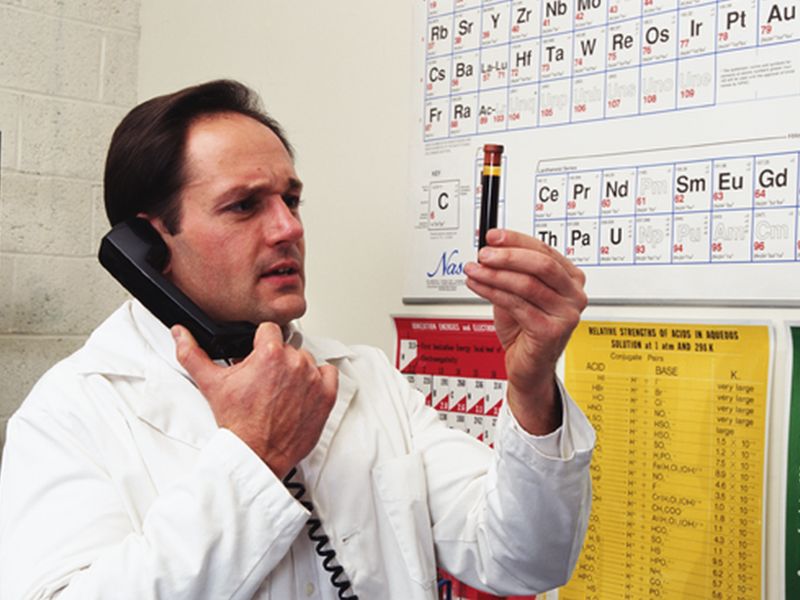
Tuesday, September 6, 2016

TUESDAY, Sept. 6, 2016 (HealthDay News) -- People with higher levels of thyroid hormone in their bloodstream may be at greater risk of sudden cardiac death, even if those levels aren't abnormally high, a new study suggests.
"Our study shows that the risk of sudden cardiac death increases with higher thyroid hormone levels, even in the normal range," said lead researcher Dr. Layal Chaker, a research fellow in endocrinology and epidemiology at Erasmus University Medical Center Rotterdam in the Netherlands.
Sudden cardiac death occurs when a person's heart stops due to a malfunction in the electrical system that drives the heartbeat.
Researchers found that people with thyroid hormone levels at the high end of the normal range were 2.5 times more likely to die from sudden cardiac death, compared with people at the lower end of the range.
In addition, the 10-year risk of sudden cardiac death was four times greater among people with high levels of thyroid hormone -- about 4 percent versus 1 percent in people with lower levels, according to the report.
This potential connection between high-normal thyroid hormone levels and sudden cardiac death is "really new, in that we really never made this association in the past," said Dr. Vincent Bufalino, an American Heart Association spokesman and cardiologist in Naperville, Ill.
"We do know that thyroid hormone in excess sort of speeds up the heart," Bufalino said. "Your metabolism is faster, higher. Your engine is running hot, so to speak," he said.
But negative effects on heart health have mainly been associated with "toxic" levels of thyroid hormone that are far above normal levels, he said.
However, it's too soon for doctors to tell people with thyroid levels at the high end of normal that they are at risk of a stopped heart, Bufalino added.
"That would be a real stretch. We couldn't go there," he said. "But it raises the issue that maybe thyroid hormone is more toxic than we thought. It makes you wonder whether or not it puts people at risk."
More than half of all heart-related deaths stem from sudden cardiac death. Most of the time victims had no previous symptoms of heart disease, the authors said in background notes.
Thyroid hormone helps regulate how the body converts food into energy, and plays an essential role in the function of the major organs, the study authors said.
For this study, Chaker and her colleagues analyzed more than 10,000 patients in the Rotterdam Study, a long-term investigation of chronic disease among the middle-aged and elderly in the Netherlands.
The researchers compared thyroid hormone levels from blood samples against the number of sudden cardiac deaths that occurred in these patients. They found an increased risk linked to high-normal hormone levels -- even after controlling for other risk factors such as cholesterol and blood pressure.
People most often have high thyroid levels because of an overactive thyroid gland, Chaker said. However, people with an underactive thyroid gland could also wind up with high levels if they are prescribed too much medication.
"In these individuals, the thyroid hormone levels are modifiable by decreasing the dose of therapy," she said.
Chaker had expected thyroid hormone levels to increase risk of sudden cardiac death, but to do so by affecting heart risk factors such as cholesterol levels and blood pressure.
"We were surprised to see that when we control our analyses for these factors, the association remained similar, suggesting that other pathways could play a role," Chaker said.
Bufalino said these findings raise the possibility that thyroid hormone can harm the heart on its own.
"The heart is working too hard because there's too much thyroid hormone around," he said. "Maybe it's at risk to become a little unstable."
The new report appears Sept. 6 in the journal Circulation.
SOURCES: Layal Chaker, M.D., M.Sc., doctoral candidate and research fellow, endocrinology and epidemiology, Erasmus University Medical Center Rotterdam, the Netherlands; Vincent Bufalino, M.D., American Heart Association spokesman and cardiologist, Naperville, Ill.; Sept. 6, 2016,Circulation
HealthDay
Copyright (c) 2016 HealthDay. All rights reserved.
News stories are provided by HealthDay and do not reflect the views of MedlinePlus, the National Library of Medicine, the National Institutes of Health, the U.S. Department of Health and Human Services, or federal policy.
- More Health News on:
- Cardiac Arrest
- Thyroid Tests









































No hay comentarios:
Publicar un comentario